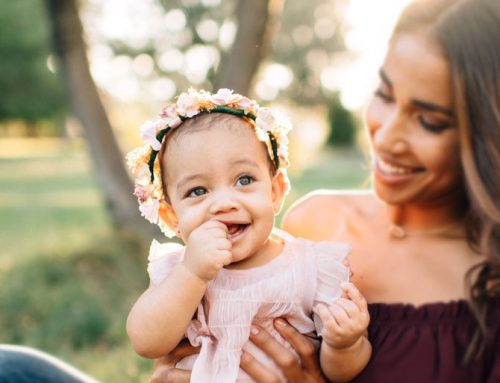by Narissa Ventress, M.A., CCC-SLP
Everyone that’s ever tried to get a 5 month old to “talk” will tell you, there are few things more irresistible than a baby’s attempt to speak. They might even make expressions as if their words (sounds) explained something profound. While incredibly adorable, a baby is actually learning communication techniques in various ways.
During the period from four to six months (or longer, every baby is different) you should start to notice your child reaching the following receptive and expressive language milestones:
- Moves eyes in direction of sounds
- Responds to changes in the tone of your voice
- Notices toys that make sounds
- Pays attention to music
You will know when your baby is progressing towards verbal communication when she meets the following milestones:
- Babbling sounds that are more speech-like with many different sounds, including p, b and m (e.g. bababa, mamama)
- Chuckles and laughs
- Vocalizes excitement and displeasure
- Makes gurgling sounds when left alone and when playing with you
This is Victoria. She is communicating by babbling and smiling in response to her sister’s kisses. She is beginning to produce different speech sounds (I hear a “b”). This is an expected developmental milestone for Victoria’s age and should be for your baby too!
Ways to encourage language development during this time:
-
- Reinforce your baby’s communication attempts by looking at him or her, speaking, and imitating his or her vocalizations.
- Repeat his or her laughter and facial expressions.
- Name the parts of your baby’s body when you touch them, such as his nose, toes, and belly button. Make up rhymes like toes, nose!
- Introduce your baby to simple syllables and words such as “baby,” “cat,” “dog,” “go,” “hot,” “cold,” and “walk,” as well as “Mama” and “Dada.” Although it may be as much as a year or more before you can interpret any of your baby’s babbling, your baby can understand many of your words well before her first birthday.
Don’t forget, every child is different and may meet developmental milestones at different times. If your baby doesn’t babble or imitate any sounds by her seventh month, it could mean a problem with her hearing or speech development. A baby with a partial hearing loss can still be startled by loud noises or turn her head in their direction, and she may even respond to your voice. If you have concerns, contact your pediatrician or a local speech-language pathologist.
An Interesting Study
A study conducted to optimize parental reading of picture books to young children. Parents were given instructions to target open-ended questions, function/attribute questions (e.g. “which ball is red?”), and expansions (responding appropriately to children’s attempts to answer these questions). The control group parents were instructed to read in their customary fashion. Posttests showed that children exposed to open ended questions, function/attribute questions, and expansions during reading demonstrated higher expressive language abilities and were more likely to use phrases rather than single words.
For more content, see:
Verbal Expectations: Birth to 3 Months
3 Essentials to Encourage Speech in Toddlers (and Babies)
See asha.org for additional resources.
Accelerating language development through picture book reading. Whitehurst, G. J.; Falco, F. L.; Lonigan, C. J.; Fischel, J. E.; DeBaryshe, B. D.; Valdez-Menchaca, M. C.; Caulfield, M. Developmental Psychology, Vol 24(4), Jul 1988, 552-559.






